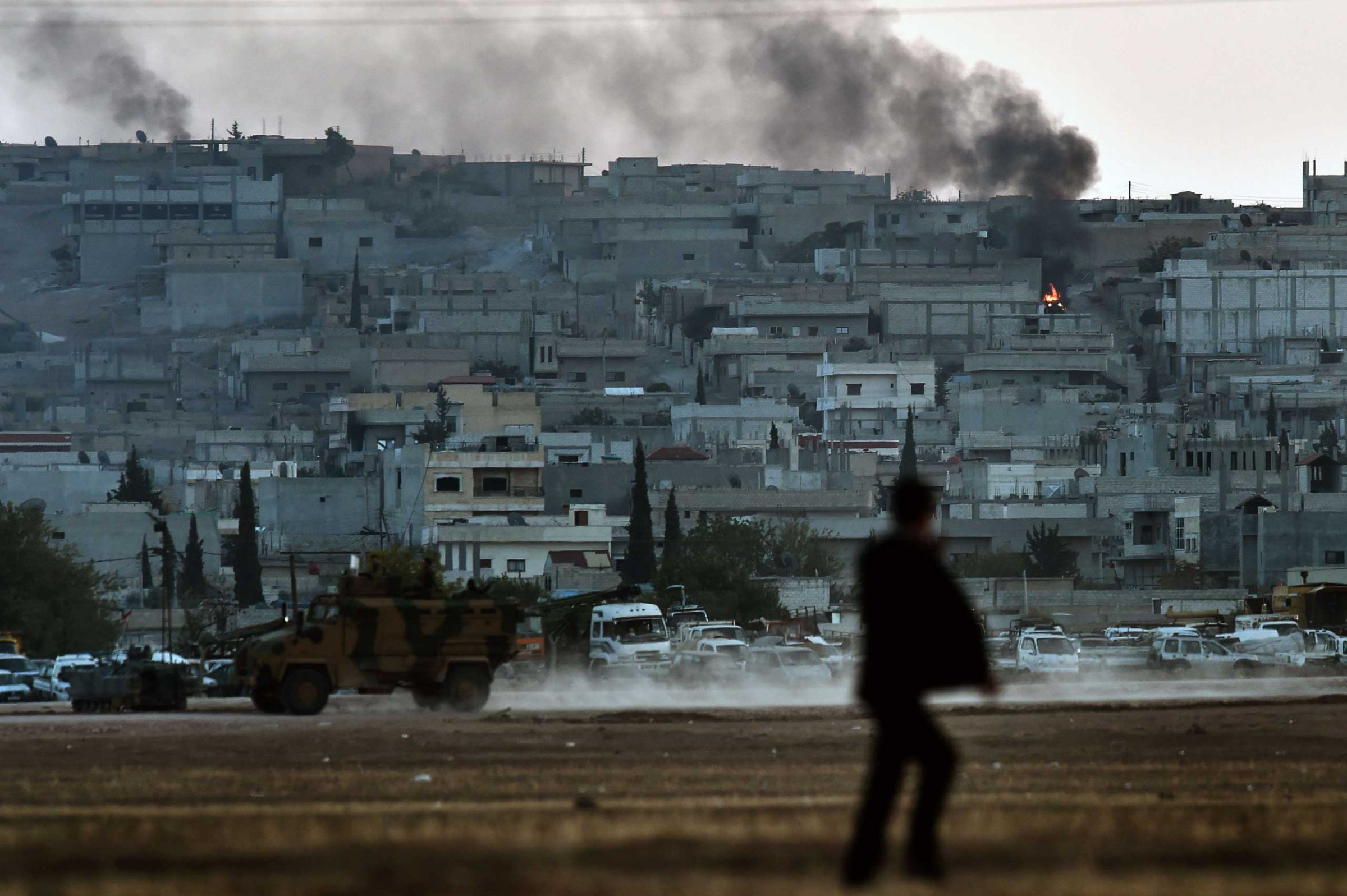
By sunset today, the black flag of the Islamic State of Iraq and Syria (ISIS) was flying on the edge of Kobani, a strategically important Syrian-Kurdish town on the Turkish border. Despite President Barack Obama’s pledge to destroy ISIS — and the ongoing air campaign that has followed that promise — the extremist group seems poised to take this town and solidify their control over a swath of the Syrian-Turkish border.
“ISIS is attacking from three sides and they are pushing into the city. We are fighting back,” said Ojlan Esso, a spokesman for the Kurdish forces in Kobani by phone. The sound of mortars hitting the city echoed in the background of the call before the line went dead.
For more than three weeks Kurdish fighters have been fending off ISIS and calling for air strikes, better weapons and for Turkey to allow Kurdish fighters to cross the border and join them in fight in Kobani. They’ve only gotten the strikes so far, courtesy of the U.S.-led coalition, and that hasn’t been enough to stop the militants’ advance.
“They’ve definitely been too few and far between to disrupt the ISIS offensive in the area,” said Jenny Cafarella, a Syria analyst at the Washington, D.C.–based Institute for the Study of War. Taking Kobani will not just be a blow to the Kurdish fighters there but a strategic gain for ISIS, broadening their control in Syria and connecting key areas under their burgeoning caliphate’s power.
Many Kurds in Kobani are angry that assistance didn’t come to the besieged city weeks ago. “I saw several air strikes today, but they should have taken place before ISIS entered Kobani,” said Abdul Azziz, a Kurdish resident from the city.
The ISIS attack on Kobani is in line with its efficient approach to combat — strategically targeting areas the group knows will have difficulty fighting back. The Syrian Kurds have a precarious relationship with the country’s opposition rebels, while Turkey has blocked weapons, supplies and fighters from entering Kobani because of Ankara’s long-standing feud with Kurdish groups.
America isn’t having any more success. So far the U.S.-led operation in Syria has focused on damaging ISIS infrastructure, targeting convoys and checkpoints instead of front-line positions and active battle sites. In part, this is because the U.S. is not coordinating with the forces fighting on the ground in Syria. In the case of Kobani, Kurdish leaders have said that they need air strikes on strategic positions where the militants are advancing.
But as the bombing has taken its toll on ISIS convoys and checkpoints, the militant group has begun limiting large movements in open daylight, making it more difficult to hit their units. “These strikes have forced ISIS to shift some of its tactics, and this shift in tactics actually increases the difficulty in acquiring target sets,” says Cafarella.
More precise strikes are impossible for now — the U.S. lacks the intelligence networks to hit key targets, says Andrew Tabler, a senior fellow at the Washington Institute, who focuses on Syria and U.S. policy in the Levant region. “You have to get these networks set up so they can feed you with this sort of information.”
It’s not just Syrian Kurds who are complaining about the impotence of the strikes. Even the moderate Syrian rebel groups that have been picked for training and weapons distribution by the U.S. have begun criticizing the early strikes in Syria, arguing that they will not be effective as long as the U.S. fails to work with fighters on the ground.
“The strikes are just not coordinated with ground objectives in mind,” said Tabler. “Concerning Syria, I can’t define a strategy there. I can’t see what it is.”
While the U.S.-led strikes against ISIS in Syria have targeted the group’s financial infrastructure and warring capability it is not having much effect on the many front lines between the militants, and both these Kurdish fighters in Kobani and the Free Syrian Army groups the U.S. talks about backing.
But even in Iraq, where the U.S. is coordinating with both the Iraqi national army and Iraqi Kurdish peshmerga forces, ISIS is still making gains in some areas. “You notice [ISIS] is advancing outside of Baghdad,” said Tabler. “So it’s hard to argue that the strikes are working to halt ISIS’s advance.”
If Kobani falls into the hands of ISIS, it may not only provide a new supply route into the caliphate and strategic territorial control, but also demonstrate that the U.S. is far from defeating the militant group
More Must-Reads from TIME
- Donald Trump Is TIME's 2024 Person of the Year
- Why We Chose Trump as Person of the Year
- Is Intermittent Fasting Good or Bad for You?
- The 100 Must-Read Books of 2024
- The 20 Best Christmas TV Episodes
- Column: If Optimism Feels Ridiculous Now, Try Hope
- The Future of Climate Action Is Trade Policy
- Merle Bombardieri Is Helping People Make the Baby Decision
Contact us at letters@time.com